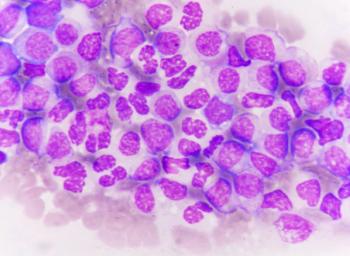
Adrienne Bruce Shannon, MD, discussed ways to improve treatment and surgical outcomes for patients with dMMR gastroesophageal cancer.

Your AI-Trained Oncology Knowledge Connection!


Adrienne Bruce Shannon, MD, discussed ways to improve treatment and surgical outcomes for patients with dMMR gastroesophageal cancer.

Intracranial disease control with Ivonescimab plus chemotherapy appears encouraging in patients with non–small cell lung cancer and brain metastases.

The agency submits complete response letters based on the enrollment status of confirmatory trials for odronextamab in follicular lymphoma and diffuse large B-cell lymphoma.

Findings from the phase 2 RAMP 201 trial highlight responses with avutometinib/defactinib in those with KRAS-mutated low-grade serous ovarian cancer and other patient subgroups.

A 50% objective response rate was observed when becotarug plus osimertinnib was combined to treat patients with EGFR exon 12 non–small cell lung cancer.

Barbara Smith, MD, PhD, spoke about the potential use of pegulicianine-guided breast cancer surgery based on reports from the phase 3 INSITE trial.

Rian M. Hasson Charles, MD, MPH, FACS, has a first-of-its-kind role at Brigham and Women’s Hospital that will focus on health equity.

The positive opinion is supported by findings from the phase 3 EMBARK trial assessing enzalutamide in patients with biochemically recurrent prostate cancer.

Mary-Ellen Taplin, MD, spoke about working in genitourinary oncology and how she has maneuvered the field as a woman.

Practices are on the cusp of better understanding small cell lung cancer that in turn can help to advance treatment strategies for patients, says Gregory Peter Kalemkerian, MD.

Several patients with TP53 Y220C–mutated ovarian cancer experience tumor shrinkage following treatment with rezatapopt in the phase 1/2 PYNNACLE study.

Lymphedema is a common adverse effect and may negatively impact a patient’s body image.

Patient-reported symptoms following surgery appear to improve with the use of perioperative telemonitoring, says Kelly M. Mahuron, MD.

Lymphedema is an adverse effect associated with breast cancer treatment, and patients should be monitored for these symptoms.

Treatment options in the refractory setting must improve for patients with resected colorectal cancer peritoneal metastasis, says Muhammad Talha Waheed, MD.

Data from the phase 3 MIRASOL trial support the full FDA approval of mirvetuximab soravtansine for those with folate receptor alpha–positive platinum-resistant ovarian cancer.

The phase 3 IMpassion030 trial did not find a survival benefit when atezolizumab was added to chemotherapy after surgery for patients with triple-negative breast cancer.

Treatment with osimertinib plus chemotherapy also shows a consistent survival benefit across prespecified NSCLC subgroups in the phase 3 FLAURA2 trial.

The phase 3 KEYLYNK-006 trial did not meet the primary end points of progression-free and overall survival in patients with metastatic nonsquamous non–small cell lung cancer.

Cancer vaccines are a “cross-cutting approach” that may be applicable across several cancer types, according to Catherine J. Wu, MD.

Data from the phase 3 KarMMa-3 trial support the approval of idecabtagene vicleucel for relapsed/refractory multiple myeloma in the European Union.

The safety of nivolumab plus ipilimumab among those with hepatocellular carcinoma in the CheckMate-9DW trial appears to be comparable with prior reports.

Although immature, overall survival data from the KEYNOTE-868 trial may support the use of pembrolizumab plus chemotherapy in patients with endometrial cancer.

Study authors note that access to multidisciplinary teams and transportation programs may help mitigate hematopoietic cell transplantation outcome disparities.

Dostarlimab plus chemotherapy appears to yield favorable overall survival in patients with mismatch repair proficient endometrial cancer.

Findings from a phase 2 trial highlight an acceptable adverse effect profile and renal function with stereotactic ablative body radiotherapy in primary renal cell cancer.

Findings suggest investigating an individualized monitoring period for stable patients with hematologic cancers to decrease financial and geographic barriers to CAR T-cell therapy.

Nab-Sirolimus appears to produce responses in patients with perivascular epithelioid sarcoma regardless of TSC1/TSC2 mutation status.

Ex vivo generation of CD3-positive, CD56-positive Natural Killer-Like (NKT) with CRX100 was successful in all 7 patients with ovarian cancer in a phase 1 trial.

The regulatory agency sets a Prescription Drug User Fee Act date of August 13, 2024, for denileukin diftitox in relapsed/refractory cutaneous T-cell lymphoma.